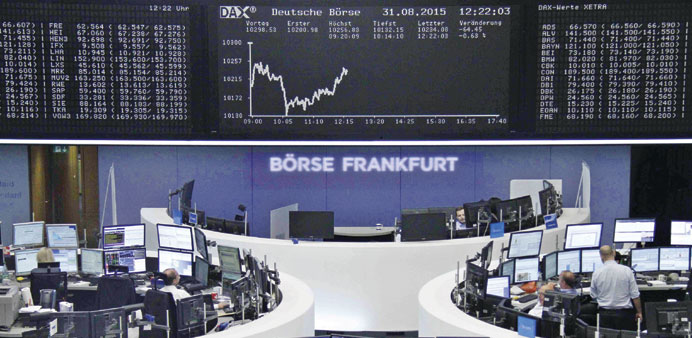Traders work in front of the DAX board at the Frankfurt Stock Exchange yesterday. The DAX 30 gave up 0.38% to 10,259.46 points compared with Friday’s close.
AFP
London
Europe’s main stock markets slid yesterday as investors still rattled by last week’s turmoil pondered China’s slowing economy and potential US interest rate moves.
The CAC 40 in Paris shed 0.47% to 4,652.95 points in mid-afternoon trading, and Frankfurt’s DAX 30 gave up 0.38% to 10,259.46 points compared with Friday’s close.
London’s stock exchange was closed for a national holiday.
Global equities were hammered last week as risk-averse investors dumped shares amid panic that the flagging Chinese economy — the world’s second largest — could spark a new worldwide recession.
Markets took much of that back in late-week gains on encouraging US economic news.
But European stocks ended August with their worst month in four years. The DAX fell by 9.3% over the month, the CAC dropped by 8.5% and the FTSE 100 in London shed 6.7%.
US stocks fell modestly in yesterday trade, after surviving last week’s extreme China-driven turmoil with net gains.
The Dow Jones Industrial Average was down 0.27% to 16,597.54 points in early afternoon trade in New York, while the S&P 500 lost 0.29% to 1,983.12, and the Nasdaq Composite gave up 0.16% to 4,820.65.
Nervousness still pervaded Wall Street after last week’s roller-coaster trade, and as some analysts continued to argue that US equities are generally overvalued.
Over the weekend Nobel economics laureate Robert Shiller, known for his sober analyses of market trends, wrote in The New York Times that based on price-to-earnings ratios, US markets are priced well above the long-term average despite the losses of recent weeks.
Lingering concerns about China and comments over the weekend by US Federal Reserve officials left analysts yesterday split over whether the US Federal Reserve would raise interest rates for the first time since 2006 next month.
In a speech at a conference on monetary policy in Jackson Hole, Wyoming, the Fed’s number two Stanley Fischer said: “We should not wait until inflation is back to two% to begin tightening.”
He added, however, that the Fed needed to “consider the overall state of the US economy as well as the influence of foreign economies on the US economy as we reach our judgement on whether and how to change monetary policy.”
The issue of the US rate rise is of importance to markets beyond what the move would say about the improving US economy. A rise would likely tamp down that appetite, and continue pulling investment out of slowing emerging economies.
The continuing suspense over rates helped lift the euro to $1.1216 yesterday from $1.1188 late Friday.

